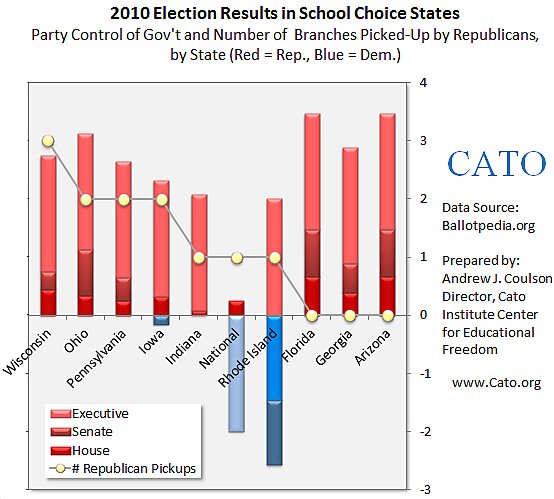Last week, I highlighted nine ballot initiatives that were worth watching because of their policy implications and/or their role is showing whether voters wanted more or less freedom. The results, by and large, are very encouraging. Let’s take a look at the results of those nine votes, as well as a few additional key initiatives.
1. The big spenders wanted to impose an income tax in the state of Washington, and they even had support from too-rich-to-care Bill Gates. The good news is that this initiative got slaughtered by a nearly two-to-one margin. I was worried about this initiative since crazy Oregon voters approved higher tax rates earlier this year. In a further bit of good news, Washington voters also approved a supermajority requirement for tax increases by a similar margin.
2. Nevada voters had a chance to vote on eminent domain abuse. This is an initiative that I mischaracterized in my original post. The language made it sound like it was designed to protect private property, but it actually was proposed by the political elite to weaken a property rights initiative that the voters previously had imposed. Fortunately, Nevada voters did not share my naiveté and the effort to weaken eminent domain protections was decisively rejected. This is important, of course, because of the Supreme Court’s reprehensible Kelo decision.
3. California voters were predictably disappointing. They rejected the initiative to legalize marijuana, thus missing an opportunity to adopt a more sensible approach to victimless crimes. The crazy voters from the Golden State also kept in place a suicidal global warming scheme that is driving jobs out of the state. The only silver lining in California’s dark cloud is that voters did approve a supermajority requirement for certain revenue increases.
4. Nearly 90 percent of voters in Kansas approved an initiative to remove any ambiguity about whether individuals have the right to keep and bear arms. Let that be a warning to those imperialist Canadians, just in case they’re plotting an invasion.
5. Arizona voters had a chance to give their opinion on Obamacare. Not surprisingly, they were not big fans, with more than 55 percent of them supporting an initiative in favor of individual choice in health care. A similar initiative was approved by an even greater margin in Oklahoma. Shifting back to Arizona, voters also strongly rejected racial and sexual discrimination by government, but they narrowly failed to approve medical marijuana.
6. Shifting to the local level, San Francisco, one of the craziest cities in America rejected a proposal to require bureaucrats to make meaningful contributions to support their bloated pension and health benefits. On the other hand, voters did approve a proposal to ban people from sleeping on sidewalks. Who knew that was a big issue?
7. Sticking with the ever-amusing Golden State, voters unfortunately eliminated the requirement for a two-thirds vote in the legislature to approve a budget, thus making it even easier for politicians to increase the burden of government spending. The state almost certainly is already on a path to bankruptcy, and this result will probably hasten its fiscal demise. Hopefully, the new GOP majority in the House of Representatives will say no when soon-to-be Governor Brown comes asking for a bailout.
8. The entire political establishment in Massachusetts was united in its opposition to an initiative to to roll back the sales tax from 6.25 percent to 3 percent, and they were sucessful. But 43 percent of voters approved, so maybe there’s some tiny sliver of hope for the Bay State.
9. Louisiana voters approved an initiative to require a two-thirds vote to approve any expansion of taxpayer-financed benefits for government employees. With 65 percent of voters saying yes to this proposal, this is a good sign that the bureaucrat gravy train may finally be slowing down.
At the risk of giving a grade, I think voters generally did a good job when asked to directly make decisions. I give them a solid B.
